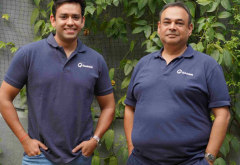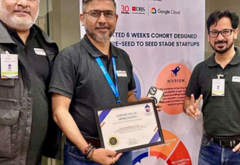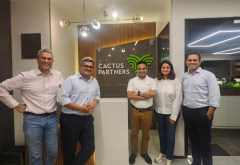In a dynamic IT landscape where technological evolution is non-negotiable, staying competitive demands strategic investments. Amit Singh, Content Head, itVARnews in an insightful conversation with Ratnakar Kanchan, Managing Director of Lauren Information Technologies, explores the imperative role of AI/ML and digital engineering and how these investments, meticulously aligned with business objectives, stand as the bedrock of sustained competitiveness in the ever-evolving digital realm. Kanchan also discusses how the company stays ahead by proactively integrating AI, blockchain, and closely monitoring the progress of quantum computing.
As we look forward to 2024, the IT landscape is evolving rapidly. From your perspective, what are the key market dynamics shaping the role of IT solution providers, and how is your organization positioning itself in response to these changes?
Navigating the dynamic IT landscape requires a strategic approach. Firstly, the increasing emphasis on cybersecurity and data privacy is pivotal. Lauren aligns itself by continually enhancing our cybersecurity solutions, ensuring clients’ data remains secure.
Secondly, the surge in demand for AI and ML solutions is undeniable. Lauren positions itself as a pioneer in data analytics, AI, and ML, providing cutting-edge solutions that empower businesses to harness the full potential of these technologies.
Moreover, the shift towards digital engineering and intelligent automation is reshaping IT requirements. Lauren remains at the forefront, offering comprehensive digital engineering services and intelligent automation through RPA.
What will be key business priorities for your organization in 2024? What are the key industry verticals and solution areas that you will focus on in 2024?
Our key business priority in 2024 will be advancing our expertise in AI & ML solutions. We are committed to constantly improving ourselves to provide clients with cutting-edge applications and insights. Our focus extends to key industry verticals, including banking, healthcare, and pharma, where we aim to tailor our solutions to address specific challenges. Lauren will continue excelling in systems and software development, ensuring our clients benefit from the latest advancements in technology. Additionally, our commitment to digital engineering, cybersecurity, and intelligent automation remains unwavering. In 2024, Lauren’s strategic emphasis is on continuous improvement and innovation across these critical solution areas to meet the evolving needs of our clients.
Which technologies do you foresee gaining prominence in the coming years, and how is your organization incorporating them into its solutions to meet the evolving needs of clients?
We foresee several emerging technologies gaining prominence in the coming years. Artificial Intelligence (AI) and Machine Learning (ML) will continue to play a pivotal role, with Lauren actively integrating these technologies into our solutions. Our focus lies on developing AI-driven applications that enhance decision-making processes for our clients.
Blockchain technology is another area poised for growth. Lauren recognizes its potential in ensuring secure and transparent transactions, particularly in sectors like finance and healthcare. We are investing in blockchain-based solutions to provide our clients with robust and tamper-proof data management systems.
Quantum computing is an area of keen interest for Lauren. While still in its nascent stages, we are monitoring developments closely to leverage its capabilities once it matures, especially in complex problem-solving scenarios.
In essence, Lauren remains committed to staying ahead of the curve by incorporating AI, blockchain, IoT, and keeping a close eye on the progress of quantum computing. This proactive approach ensures that our solutions consistently meet the evolving needs of our clients in the dynamic landscape of emerging technologies.
Digital transformation is a continual journey for businesses. How does your organization help clients navigate their digital transformation initiatives, and what strategies do you recommend for organizations to stay competitive in the digital age?
Guiding clients through their digital transformation journey is a core focus. We adopt a holistic approach, starting with a thorough assessment of their current systems and processes. Lauren’s existing expertise in systems and software allows us to identify areas for improvement and innovation.
Our strategy involves the integration of cutting-edge technologies like AI/ML into existing frameworks, enhancing automation and decision-making capabilities. Our cybersecurity services ensure a secure digital transformation, safeguarding clients’ data throughout the process.
To stay competitive in the digital age, organizations must prioritize agility. We advise clients to embrace a culture of continuous innovation and cost optimization, encouraging experimentation and adaptation. Strategic investments in AI, ML, and digital engineering, aligned with business objectives, are crucial for sustained competitiveness.
How is your organization supporting clients in their cloud adoption journeys, and what considerations should organizations keep in mind when migrating to or optimizing their cloud infrastructure?
Our commitment to supporting clients in their cloud adoption journeys is paramount. We guide clients through a seamless transition by leveraging our expertise in cloud services. Our offerings span a spectrum of cloud solutions, including Infrastructure as a Service (IaaS), Platform as a Service (PaaS), and Software as a Service (SaaS).
To facilitate successful cloud adoption, we emphasize a thorough assessment of clients’ existing infrastructure, ensuring a tailored migration strategy. We prioritize scalability, enabling clients to adapt to changing needs efficiently. Our team also focuses on robust cybersecurity measures to safeguard data integrity and confidentiality in the cloud environment.
Organizations considering cloud migration or optimization should prioritize a comprehensive evaluation of their applications and data and we recommend a phased approach, starting with non-critical workloads, to minimize disruption and ensure a smooth transition.
From your perspective, what are the key elements of a successful and collaborative vendor-channel relationship?
Fostering a successful and collaborative vendor-channel relationship hinges on several key elements. Firstly, clear communication is imperative. Establishing transparent lines of communication ensures that expectations, deliverables, and any potential challenges are openly discussed and addressed.
Secondly, mutual trust forms the foundation of a fruitful partnership. We value trust in our vendor-channel relationships, understanding that it is earned through consistent performance, reliability, and a shared commitment to success.
Moreover, alignment in strategic goals is crucial. We seek vendors and channels that align with our mission and values, creating a synergy that propels both parties toward shared objectives. Regular collaboration and joint planning sessions contribute to this alignment.
 Latest Technology News Today – Get Latest Information Technology Updates and Services Latest Technology News Today – Get Latest Information Technology Updates and Services
Latest Technology News Today – Get Latest Information Technology Updates and Services Latest Technology News Today – Get Latest Information Technology Updates and Services 









